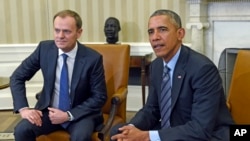U.S. President Barack Obama says transatlantic unity is the strongest it’s ever been as the West confronts Russian aggression in Ukraine. He made the comments alongside European Union Council President Donald Tusk before heading into talks Monday.
As he welcomed former Polish Prime Minister Tusk to the White House, President Obama outlined what he called the significant challenges facing the West, most notably the situation in Ukraine.
“We are all committed to making sure that we uphold the basic principles of sovereignty and territorial integrity that have been threatened by Russian aggression. We have been able to maintain strong unity with respect to sanctions," said President Obama.
The show of unity is key as officials say Russia and Russian-backed separatists continue to flout the Minsk peace agreement, and violence flares in eastern Ukraine.
On Monday, EU Council President Tusk said there has never been a greater need for unity between Europe and United States.
He said the world is witnessing an attack on the fundamental values of freedom, democracy and the geopolitical order.
“We can see with full clarity that they are trying to divide us inside of Europe, as well as Europe and America. But when we are united, we will be able to put a stop to the aggressive policy of Russia," said Tusk.
The United States and the European Union have come together in implementing sanctions on Russia that analysts say have had a severe negative impact on Moscow’s economy.
But critics of the Obama administration’s policy have called for the U.S. to do more to counter Russia and Russian-backed separatists, including sending military aid to Ukraine - a move Obama has so far resisted.
Former U.S. ambassador to Ukraine Steven Pifer says it is unlikely the EU will support additional sanctions against Russia, unless there is a major breach of the fragile cease-fire, such as an attempt to take Mariupol. But he says the current sanctions regime is already taking a toll, with inflation at 17 percent in Russia.
During Monday's talks, Obama and Tusk also discussed Transatlantic Trade and Investment Partnership (TTIP) negotiations, with the EU Council president noting the bilateral free trade agreement is not only about trade, but about geopolitical security and transatlantic cooperation.
The European leader also expressed concern about the spread of violent extremism in North Africa, saying the West must help Libya.
“We cannot have a failed state run by warlords and fanatics slipping into anarchy just 100 miles [161 kilometers] from the southern coast of Europe," said Tusk.
At a time of Russian aggression in Ukraine, growing instability in North Africa and the Middle East, and the rise of the Islamic State, EU Council President Tusk emphasized the importance of unity among Western nations - ending his remarks to the White House press with the words “united we stand, divided we fall.”
Meanwhile, Ukraine's President Petro Poroshenko says pro-Russian rebels have withdrawn a "significant" amount of heavy weaponry from the front lines in eastern Ukraine, and says his government has pulled back the "lion's share" of its weaponry as well.
Speaking Monday on national television, Poroshenko also said attacks that have marred the three week-old truce have fallen significantly. He said 64 Ukrainian servicemen have been killed since the internationally brokered cease-fire deal was announced February 15 in Belarus.




